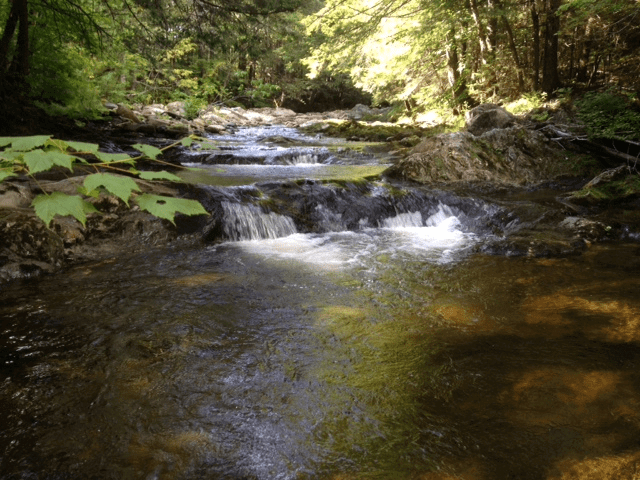Grateful for summer and dreaming of fall

For an outdoorsman, August can be a bit of a challenge. The lake is usually lower than the rest of the year, and the temperature of the water is only tolerable for warmwater fishing—largemouth and smallmouth bass, pike, panfish and the exotic dinosaurs, gar and bowfin. I’m not a snob but I prefer the cold clear water in the mountain streams fishing for my favorite salmonid, Salvelinus fontinalis, the brook trout.
The colloquial term” brookies” fits these beautiful fish well, as they are found in only the coldest clearest and cleanest waters. Interestingly, these jewels are really a remnant of the glacial period and are one of the char family, which is why the colors are so extraordinary. The red dots surrounded by blue halos, the bright orange fins tipped with white and the vermiculated markings on the greenish brown back provide this majestic little trout with the ability to hide in shady and rocky streams.
I enjoy nothing more in late July and August than finding the cold headwaters of the bigger rivers and ducking under a canopy of leaves and quietly stalking this lovely little fish. But when the water temperatures reach into the 60s and above, I leave them alone, for although they are one of the most voracious fighters, their strength is significantly lessened by the warm temps. They thrive in water temps in the lower 50s but can die after a fight if water temps are in the high 60s or 70s.
Before I consider tossing my favorite rust-colored thorax elk hair caddis fly into the gurgling stream, I always take a temperature check. If it’s over 60 degrees, I will walk away and look for chanterelle mushrooms or the mighty boletes under the shade of pines.
But when there are no brookies to catch and release or mushrooms to harvest, I turn to cleaning out the trailer full of goose decoys and wash each one with Murphy’s oil soap, then rinse them off well to dry in the sun. I will repaint a few decoy heads and check all their foot stands, then organize the trailer for the upcoming goose season, which starts September first. Then I will sequester myself in the garage and work on the old Barnegat sneakboat for duck season. This year it needs a bit of hull work: sanding and painting the bottom, adding a new keel guard and sealing a small hole in the transom.
When I built this boat 15 years ago, I was told that to build a wooden boat—especially a hard-working duck boat—I would have to enjoy the maintenance of such a vessel lest I be constantly frustrated with its upkeep. I embraced that ideology and have worked on repairing and improving it each year. This year I will be adding a new lower-profile grass blind to the cockpit, so that I will be laying down on the floor in a semi-reclining position with nothing peeking out but my head, covered with camo netting. I’ll be virtually invisible!
As I sit here in my den, drinking iced homemade strawberry sage kombucha and dreaming of fall, I am anticipating the new chapter of Delta Waterfowl’s “Delta Day” at North Country Sportsman’s Club in Williston on Saturday, Sept. 7. Delta will be hosting the day of skeet and trap shooting with prizes, wood-duck nesting-box building and hen-nesting “rolls,” waterfowl-calling demonstrations and a grand BBQ. The event starts at 10:00 a.m. and runs until 6:00 p.m. If you’d like a little exposure to the wonderful world of waterfowling, swing by and join in the fun. It will be set up as a benefit for Delta Waterfowl’s conservation programs and research. For more information go to Facebook and search for “Delta Day.”
As summer winds down and the kids are trying to squeeze out the last good juice of summer, the outdoorsmen and women are just getting geared up for their favorite time of the year. Lest we anticipate the future without being grateful for the present, we should do the same. If you have a chance to sneak up into the mountains and locate a cool pool of water, toss a line in and maybe feel that magical tug on the rod. Afterward, throw yourself into the clear cold water and soak in the last few days of summer’s bounty.
Bradley Carleton is executive director of Sacred Hunter, a nonprofit that seeks to educate the public on the spiritual connection of man to nature.

